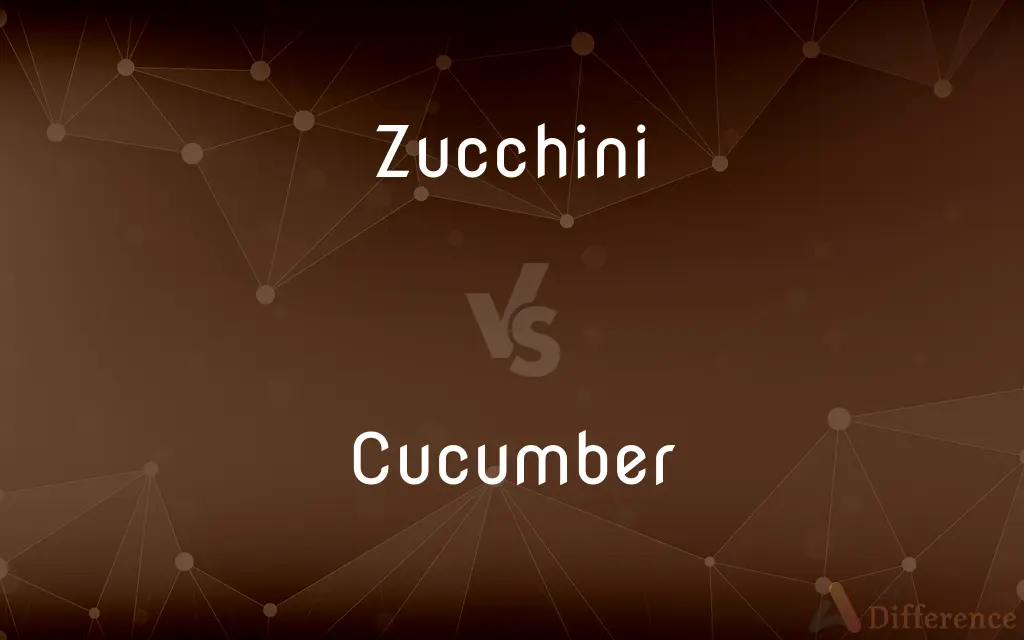Zucchini vs. Cucumber — What's the Difference?
Edited by Tayyaba Rehman — By Urooj Arif — Updated on April 15, 2024
Zucchini is a type of summer squash with a soft, edible rind, often cooked before eating; cucumbers are crisp with a high water content, typically eaten raw in salads or pickled.

Difference Between Zucchini and Cucumber
Table of Contents
ADVERTISEMENT
Key Differences
Zucchini, a summer squash, has a mildly sweet flavor that becomes more pronounced when cooked, making it a popular ingredient in stews and baked dishes. Whereas cucumbers are known for their fresh, crisp texture and mild, refreshing taste, commonly used in salads, sandwiches, and as a garnish.
Zucchini's skin is soft and smooth, and it is usually dark green, though it can come in yellow or light green. On the other hand, cucumbers have a waxy, firm outer skin, typically bright to dark green, designed to protect their high moisture content.
When it comes to nutritional content, zucchini is rich in vitamin C and dietary fiber, contributing to its low calorie but nutrient-dense profile. Conversely, cucumbers are even lower in calories and contain fewer nutrients but are high in water, making them hydrating.
In the culinary world, zucchini is versatile, often grated into breads, sliced into noodles, or stuffed and baked. Cucumbers, however, are predominantly used raw, chopped into salads, or sliced for dips and sometimes pickled for an extended shelf life.
Zucchini plants bear fruit that grows quickly and is best harvested when young and tender. In contrast, cucumber plants produce fruit that should also be picked before it becomes too large and seedy, maintaining its best texture and flavor.
ADVERTISEMENT
Comparison Chart
Type
Summer squash
Fruit (botanically), vegetable (culinary)
Texture
Soft, becomes tender when cooked
Crisp, refreshing, eaten raw
Culinary Uses
Cooked in various dishes, grated or stuffed
Eaten raw, pickled
Flavor
Mildly sweet, more flavorful when cooked
Mild, slightly sweet, refreshing
Nutritional Content
Higher in vitamins, lower in water
High in water, lower in calories
Compare with Definitions
Zucchini
Known for its role in zucchini bread, a popular type of quick bread.
Zucchini bread is a moist, flavorful option for breakfast or snacks.
Cucumber
Can be pickled to make pickles, a popular snack and condiment.
Homemade pickles start with fresh cucumbers and a brine solution.
Zucchini
Often harvested while still immature for the best flavor.
Young zucchini tend to be more tender and flavorful than their overgrown counterparts.
Cucumber
Recognizable by its smooth, waxy skin and cylindrical shape.
He picked a fresh cucumber from the vine for lunch.
Zucchini
The fruit of the zucchini plant, soft and mild in flavor.
She added chopped zucchini to the vegetable stew for extra texture.
Cucumber
A long, green fruit with a crisp texture used mainly in salads.
Cucumber slices add a refreshing crunch to any salad.
Zucchini
A green, elongated squash used primarily in cooked dishes.
Zucchini is often spiralized into noodles as a low-carb pasta substitute.
Cucumber
Often served raw and used in culinary applications worldwide.
Cucumber is a staple ingredient in Greek tzatziki sauce.
Zucchini
Cultivated widely in summer gardens.
Their garden zucchini has begun to flower and will soon produce fruit.
Cucumber
High water content makes it a hydrating food choice.
Eating cucumber helps stay hydrated during hot weather.
Zucchini
The zucchini ( (listen); plural: zucchini or zucchinis), courgette (; plural: courgettes) or baby marrow (Cucurbita pepo) is a summer squash, a vining herbaceous plant whose fruit are harvested when their immature seeds and epicarp (rind) are still soft and edible. It is closely related, but not identical, to the marrow; its fruit may be called marrow when mature.
Cucumber
Cucumber (Cucumis sativus) is a widely-cultivated creeping vine plant in the Cucurbitaceae gourd family that bears usually cylindrical fruits, which are used as vegetables. Considered an annual plant, there are three main varieties of cucumber — slicing, pickling, and burpless/seedless — within which several cultivars have been created.
Zucchini
A variety of summer squash (Cucurbita pepo) having an elongated shape and a smooth, thin, dark green rind.
Cucumber
A tendril-bearing, climbing or sprawling annual plant (Cucumis sativus) widely cultivated for its edible cylindrical fruit that has a green rind and crisp white flesh.
Zucchini
A courgette; a variety of squash, Cucurbita pepo, which bears edible fruit.
Cucumber
The fruit of this plant, harvested when immature and eaten fresh or pickled.
Zucchini
The edible fruit of this variety of squash.
Cucumber
Any of several related or similar plants, such as the bur cucumber or the squirting cucumber.
Zucchini
Marrow squash plant whose fruit are eaten when small
Cucumber
A vine in the gourd family, Cucumis sativus.
Zucchini
Small cucumber-shaped vegetable marrow; typically dark green
Cucumber
The edible fruit of this plant, having a green rind and crisp white flesh.
Cucumber
A person who is calm and self-possessed.
Cucumber
A creeping plant, and its fruit, of several species of the genus Cucumis, esp. Cucumis sativus, the unripe fruit of which is eaten either fresh or picked. Also, similar plants or fruits of several other genera. See below.
Cucumber
A melon vine of the genus Cucumis; cultivated from earliest times for its cylindrical green fruit
Cucumber
Cylindrical green fruit with thin green rind and white flesh eaten as a vegetable; related to melons
Common Curiosities
Can zucchini be eaten raw like cucumber?
Yes, zucchini can be eaten raw and is often sliced thin for salads, though it is more commonly cooked.
Which has more nutrients, zucchini or cucumber?
Zucchini generally contains more vitamins and nutrients compared to cucumbers.
What is the main difference in taste between zucchini and cucumber?
Zucchini has a mildly sweet taste, which intensifies upon cooking; cucumbers are more neutral with a refreshing quality.
How are zucchinis and cucumbers best stored?
Both should be stored in the refrigerator, but zucchinis have a slightly longer shelf life when kept cool and dry.
What are common dishes that use zucchini?
Zucchini is versatile in dishes like ratatouille, zucchini bread, and stuffed zucchini.
Are zucchinis or cucumbers better for hydration?
Cucumbers, with their higher water content, are better for hydration.
Why might one choose zucchini over cucumber in a recipe?
Zucchini offers a sweetness and tenderness that works well in cooked dishes.
Can both zucchini and cucumber be pickled?
Yes, both can be pickled, though cucumbers are more traditionally used for pickling.
What are common dishes that use cucumber?
Cucumbers are often found in salads, sandwiches, sushi, and dishes like tzatziki.
How do the growing conditions for zucchini and cucumber differ?
Both prefer warm, fertile soil, but cucumbers require more water to support their high hydration fruit.
Why might one choose cucumber over zucchini?
For a crisp, hydrating addition to raw dishes, cucumber is preferred.
What is the calorie count comparison between zucchini and cucumber?
Cucumbers have fewer calories due primarily to their higher water content.
What types of zucchini are there?
Varieties include green, yellow, and round zucchinis.
Are zucchini and cucumber fruits or vegetables?
Botanically, both are fruits, but they are typically treated as vegetables in culinary contexts.
What types of cucumber are there?
Includes slicing, pickling, and burpless cucumbers.
Share Your Discovery

Previous Comparison
Nausea vs. Hunger
Next Comparison
Realized vs. RealizeAuthor Spotlight
Written by
Urooj ArifUrooj is a skilled content writer at Ask Difference, known for her exceptional ability to simplify complex topics into engaging and informative content. With a passion for research and a flair for clear, concise writing, she consistently delivers articles that resonate with our diverse audience.
Edited by
Tayyaba RehmanTayyaba Rehman is a distinguished writer, currently serving as a primary contributor to askdifference.com. As a researcher in semantics and etymology, Tayyaba's passion for the complexity of languages and their distinctions has found a perfect home on the platform. Tayyaba delves into the intricacies of language, distinguishing between commonly confused words and phrases, thereby providing clarity for readers worldwide.















































